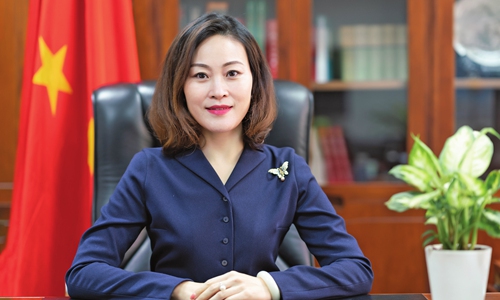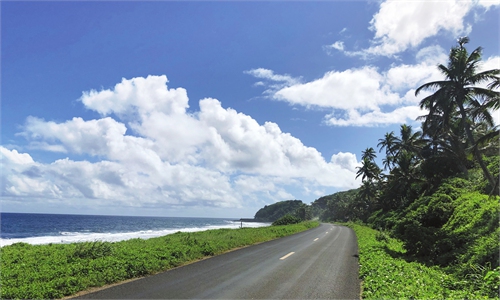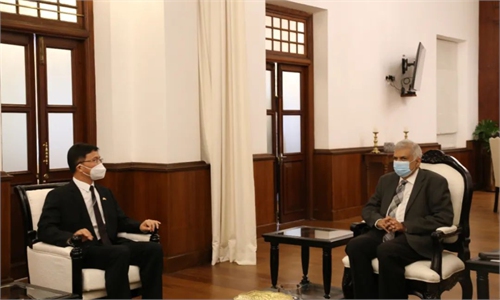China-Vanuatu relations a model of mutual respect, solidarity and coordination: Chinese ambassador
BRI projects hailed as ‘beacon of hope’ by local people
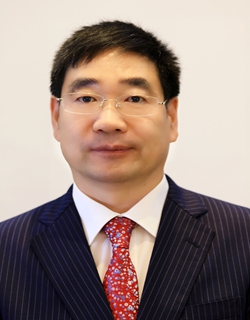
Zhou Haicheng, Chinese Ambassador to Vanuatu Photo: Courtesy of the Chinese Embassy in Vanuatu
Editor's Note:
China and Vanuatu have achieved common development during the past 40 years since the establishment of diplomatic ties in 1982. In 2019, the two countries signed a cooperation plan within the framework of the China-proposed Belt and Road Initiative (BRI). Over recent years, the two have signed more than 10 cooperation documents in fishery, maritime affairs, science and technology, civil aviation transportation, infrastructure and police exchanges and cooperation, striving to promote practical exchanges and cooperation in an all-round way.
The Global Times (GT) recently conducted an interview with Zhou Haicheng (Zhou), the Chinese Ambassador to Vanuatu, to discuss the resilience of the bilateral relationship, the fruitful results of the bilateral cooperation, and future cooperation, such as fighting the COVID-19 pandemic and blue economy.
GT: It has been 40 years since the establishment of diplomatic relations between China and Vanuatu. How would you describe the development of bilateral relationship in these 40 years?
Zhou: On March 26, Chinese President Xi Jinping exchanged congratulatory messages with President Tallis Obed Moses of the Republic of Vanuatu to celebrate the 40th anniversary of the establishment of diplomatic ties between China and Vanuatu.
In his message, President Xi made precise remarks on the development of China-Vanuatu relations over the past 40 years.
President Xi pointed out that bilateral relations have withstood the tests of evolving international landscape, mutual political trust has been ever deepening, and bilateral exchanges and cooperation in various fields have borne fruitful outcomes, bringing tangible benefits to the two peoples. China and Vanuatu have rendered mutual assistance and fought shoulder to shoulder against the COVID-19 pandemic, which has deepened the friendship between the two countries. China-Vanuatu relations have become a model of mutual respect, solidarity and coordination between developing countries.
Going forward, we will take China-Vanuatu Comprehensive Strategic Partnership to a new level and bring more benefits to our two countries and peoples.
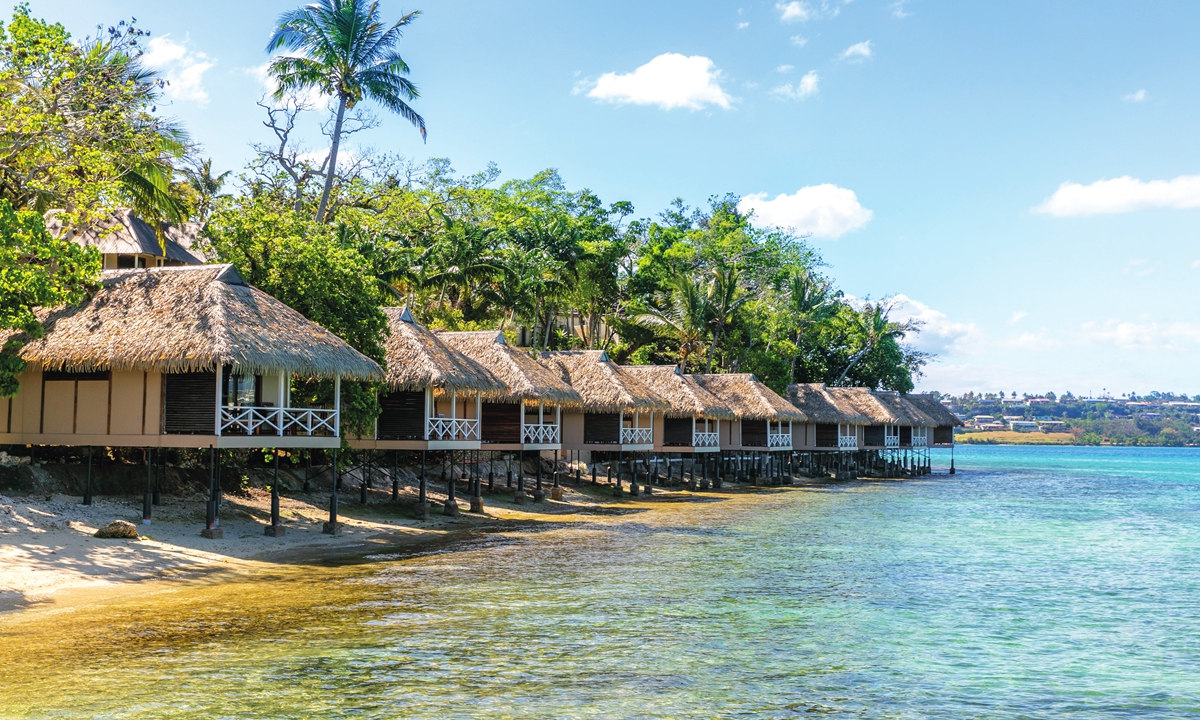
The seaside resort in Vanuatu Photo: VCG
GT: If you had three key words to describe your impression and the characteristics of Vanuatu, what three words would you choose?Zhou: Faraway, mysterious and beautiful.
I think the first word to describe is faraway. Vanuatu locates in the southwest corner of the South Pacific Ocean. There are no direct flights between China and Vanuatu so far. Before the COVID-19 outbreak, it took at least 13 hours to fly back to Beijing from Vanuatu's capital Port Vila via Australia, not including connecting time.
The second word is mysterious. Vanuatu is home to nine of the 45 active volcanoes in the entire South Pacific region. The Pacific Ring of Fire has created many rare natural wonders in Vanuatu, and also brought many natural disasters such as tsunamis and hurricanes to the local people. These disasters have also aroused Vanuatuan's strong awareness of climate change and environmental protection.
The third word is beautiful. The rich, changeable and mysterious natural environment has made Vanuatu a famous tourist destination in the South Pacific region and known as a photographer's paradise. The world's only "underwater post office" sits on the ocean floor off Hideaway Island.
With an average annual temperature of 25 C, Vanuatu's pleasant climate breeds abundant crops such as cocoa, coffee, and coconuts. These continue to attract tourists and investors from all over the world. In recent years, as China further opens up to the outside world, more and more Vanuatu products have entered the Chinese market.
GT: The BRI projects are being developed in Vanuatu. What do these projects mean to the lives of local people? How do they evaluate these projects?
Zhou: The BRI originated in China, but its opportunities and outcomes belong to the world. Vanuatu is one of the first Pacific Island Countries (PICs) to join the BRI. In 2019, the two countries formally signed the Belt and Road Cooperation Plan, drawing up a magnificent blueprint for all-round practical cooperation between China and Vanuatu.
China and Vanuatu are becoming increasingly intertwined in a community of shared future. And BRI brought tangible benefits to Vanuatu.
China's construction projects, such as the Parliament Building, the National Stadium, and Malakula island highway, can be seen everywhere in Vanuatu. They have become landmark projects in Vanuatu and even the entire Pacific Island region. These infrastructure projects have greatly boosted the economic development of Vanuatu's rural areas.
The BRI projects have also greatly improved the living standards of Vanuatu people.
The Tanna Rural Roads and Malekula Ring Road Rehabilitation Project built by China has successfully connected local villages and communities, and has been hailed as a "road of hope" and "road to the future" by local people.
The extension project of Malapoa College has created better conditions for local school-age young people to attend school and is hailed as a "beacon of hope" by local people.
In addition, the China-Vanuatu joint venture fishery processing plant was put into operation in 2019, which directly rewrote the history of Vanuatu fishery development, making Vanuatu tuna export a reality and creating more jobs and income for Vanuatuan. The processing plant also sells a variety of fish products to the local people. The products are very popular among local people for cheap price and good quality and have become hot sellers in the capital - Port Vila.
Through the BRI, China welcomes Vanuatu aboard the bullet train of China's development.
For four consecutive years, China has invited the Vanuatu government and enterprises to participate in the China International Import Expo, providing a platform and opportunity for Vanuatu to introduce its special agricultural and sideline products and tourism resources, which would help Vanuatu better integrate into the global supply chain, industrial chain and value chain.
It has been proved that jointly building the BRI serves the common interests of China and the PICs including Vanuatu, providing new opportunities and paving a new path for China-Vanuatu cooperation.
China will continue to support Vanuatu's national development and sustainable development, encourage competent Chinese enterprises to invest and do business in Vanuatu, and advance bilateral cooperation in a wide range of areas including trade and investment, infrastructure construction, transportation, communications, agriculture and fishery, tourism, culture, education and health, and climate change.
Efforts will be made to align the Global Development Initiative with Vanuatu 2030, the National Sustainable Development Plan for the period 2016 to 2030, and promote the sustained, sound and stable development of China-Vanuatu relations.
GT: What efforts have China made to cooperate with Vanuatu in fighting the COVID-19 pandemic?
Zhou: Vanuatu is much less densely populated than China. Vanuatu has a land area of 12,200 square kilometers and a population of only about 300,000. In addition, Vanuatu is a tropical marine climate with strong ultraviolet rays, which can contain the spread of the epidemic to a certain extent.
However, we must note that Vanuatu just graduated from the list of the world's least developed countries in December 2020. Its infrastructure is backward, and its medical resources are seriously inadequate.
According to statistics, at the time of the global outbreak of COVID-19 in 2020, there were less than 30 doctors, only over 200 nurses, only two ventilators in Vanuatu. The number of medical masks and other protective materials was negligible, and there was no capacity for diagnosis, screening, prevention, control and treatment of the coronavirus.
Since the COVID-19 outbreak, China and Vanuatu have stood together and helped each other. At the height of the epidemic in China, Vanuatu overcame its own financial difficulties and provided 10 million vatu ($90,174) in cash assistance to China, becoming the first country in the Pacific Island region to provide assistance to China in the name of its government.
Later, when Vanuatu was at huge risk of epidemic outbreak, China also quickly provided Vanuatu with funds and a large number of epidemic prevention supplies, including masks, protective suits, goggles, temperature guns and ventilators, via chartered flights, container shipping and international express delivery.
The supplies and funds have effectively helped Vanuatu improve its epidemic prevention and control capacity and safeguarded the health and safety of the Vanuatu people, which has been highly appreciated by the Vanuatu government and people.
In June 2021, the first shipment of 20,000 COVID-19 vaccines donated by the Chinese government arrived in Port Vila. This was the first bilateral vaccine assistance for Vanuatu and is significant for the implementation of a national vaccination program. Our vaccine has been widely accepted by the Vanuatu communities, with Vanuatu Prime Minister Bob Loughman spearheaded the vaccination campaign.
In November last year, at Vanuatu's request, the Chinese government provided another 80,000 doses of vaccine to Vanuatu despite difficulties in international transportation, further helping Vanuatu raise its national vaccine coverage rate.
At present, Vanuatu is experiencing an outbreak of community transmission and an increasing number of infected people. The situation of the epidemic is extremely complex and severe. In addition, Vanuatu has been in a state of lockdown in the past two years to fight the epidemic. Tourism and other pillar industries in Vanuatu have been dealt a devastating blow, economic recovery has been weak, and people's lives have become increasingly difficult.
At this critical moment, China plans to continue to provide Vanuatu with vaccines, supplies, capital and human resources, and vigorously support the Vanuatu government and people in fighting the epidemic and developing the economy.
